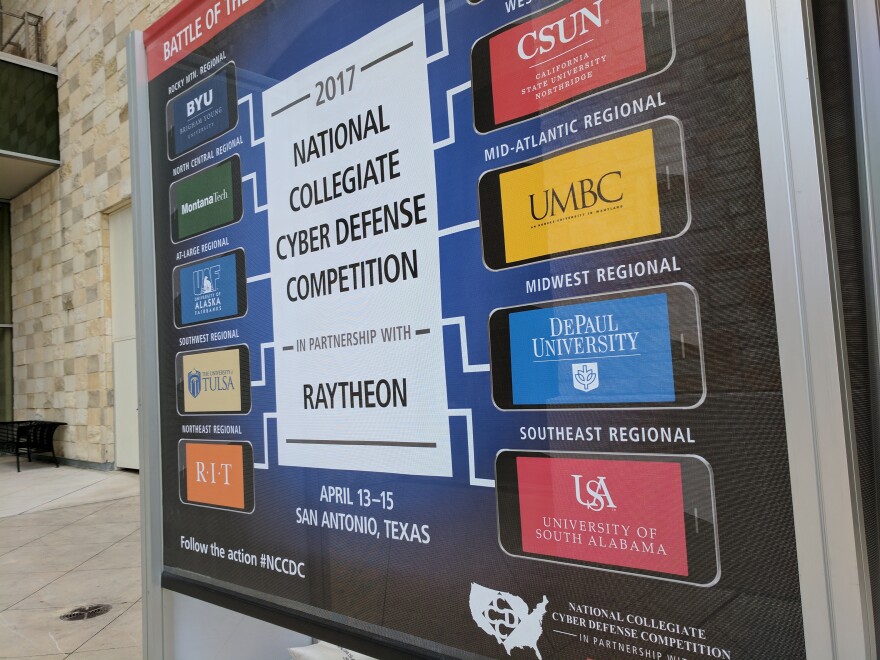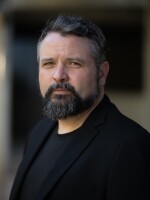Among the whir of computer fans, students are working to hold off a cyber attack that could derail their e-commerce business.
"Can someone SSH in and check if this is live?" asks Sarah Cuhna, a first year masters degree student at Brigham Young University.
Cuhna and seven other students on Team Autolock are furiously relaying information to one another, updating systems on their network, as the team is bombarded by hackers.
"You're in? Fixed it!" Cuhna yells while high-fiving another student.
The team manages to get one faltering piece of their network back in order, but it is just the beginning of day two at the National Collegiate Cyber Defense Competition, a day designed to confuse, disorient and fluster students.
This year, 230 university teams competed. Only 10 regional winners made it to the finals at San Antonio's Henry B Gonzalez Convention Centerand administered by the University of Texas San Antonio. Rather than competing against one another directly, teams are scored on how they defend their network from a team of professional hackers, the Red Team.

Simulating a real business is one of the goals of the competition, and most real-life businesses don't have the best gear. This is something BYU senior Haley Dennis is learning.
"A lot of things are not up to date, which is a little frustrating," says Dennis.
Things like servers that reached their end of life two years ago or systems that were never intended to work together.
Students have to get their networks up and running on a short timeline and keep them online, so their businesses can operate. In addition, they have simulated customers and a simulated CEO breathing down their necks. Their scores depend on doing all of these things well.

"You know, it's like the Thanksgiving dinner plate," says BYU Team Captain Hans Farnbach. "You got a bunch of potatoes. You got a bunch of turkey. You got a bunch of peas. You got a bunch of ham. You got a bunch of everything, and now you gotta eat it all. And you just can't."
The team of professional hackers, or Red Team, is run by cyber security professional David Cowen. He says just breaking into the students' computers isn't the point.
"Because it's really easy to break into a computer. The point is to teach them how to defend a real-world network," he says.
Cowen has run the competition's Red Team for 11 years. They are just down the hall from the students in a bigger, messier room filled with dozens of laptops and a massive screen projected onto the wall with a whole lot of code.
Cowen says the 30-person Red Team represents some of the best professional cyber defense talent in the country. It's composed of government, military, major Dot Coms, and even some former student competitors as well.
On day two, the Red Team opens up the flood gates of attack. Teams that win this competition are the ones that don't freak out and give up.
It's high stress for the students, but Cowen says competing in this event is huge for students.
"If you make it to nationals, you have a job. There is no question if they want one, they are hired by the end of the weekend. But if they win? They get whatever job they want," he says.
Faculty leaders say many of their competing students have started first jobs with six-figure salaries. Cowen says recruiters pay a lot of money to be at the competition, just to pitch the nations top talent.
Defense contractor Raytheon is the title sponsor. Raytheon Director Mike Williams says this is where the talent is.
"We really see this as the national primary cyber defense competition. This really is sort of the U.S. Olympics for schools," says Williams.
Demand for cyber security professionals is already high, with an estimated 1.5 million unfilled jobs projected globally by 2020. Although employment may not be the biggest draw for students.
"I wouldn't say it's an important part of being here. It's a nice bonus," says BYU's Hans Farnbach. "It's the mint on the pillow when you go to the hotel room."
For Farnbach, it's more about getting to compete and use all the stuff he has learned. Teammate Haley Dennis has already accepted a job with Cisco before she arrived at the competition.
Brigham Young University finished third in the National Cyber Defense Competition, behind second place Tulsa and first place University of Maryland Baltimore County.




